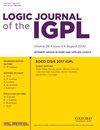模态逻辑的基扩展语义
IF 0.8
4区 数学
Q2 LOGIC
引用次数: 0
摘要
在证明论语义学中,意义是以推理为基础的。它可以被视为逻辑推论主义解释的数学表达。最近的许多工作都集中在基数扩展语义学上,在这种语义学中,公式的有效性是由原子规则 "基数 "中的可证明性产生的归纳定义给出的。经典命题逻辑和直觉命题逻辑的基扩展语义学已被多位学者探索过。在本文中,我们为经典命题模态系统 $K$、$KT$、$K4$ 和 $S4$ 开发了基扩展语义,并以 $\square $ 作为主要模态算子。我们建立了适当的健全性和完备性定理,并建立了$\square $与$\lozenge $的自然呈现之间的对偶性。我们还证明了我们目前的语义形式对于欧几里得模态逻辑并不完整。我们的表述主要使用了基上的关系结构。本文章由计算机程序翻译,如有差异,请以英文原文为准。
Base-extension semantics for modal logic
In proof-theoretic semantics, meaning is based on inference. It may seen as the mathematical expression of the inferentialist interpretation of logic. Much recent work has focused on base-extension semantics, in which the validity of formulas is given by an inductive definition generated by provability in a ‘base’ of atomic rules. Base-extension semantics for classical and intuitionistic propositional logic have been explored by several authors. In this paper, we develop base-extension semantics for the classical propositional modal systems $K$, $KT$, $K4$ and $S4$, with $\square $ as the primary modal operator. We establish appropriate soundness and completeness theorems and establish the duality between $\square $ and a natural presentation of $\lozenge $. We also show that our semantics is in its current form not complete with respect to euclidean modal logics. Our formulation makes essential use of relational structures on bases.
求助全文
通过发布文献求助,成功后即可免费获取论文全文。
去求助
来源期刊
CiteScore
2.60
自引率
10.00%
发文量
76
审稿时长
6-12 weeks
期刊介绍:
Logic Journal of the IGPL publishes papers in all areas of pure and applied logic, including pure logical systems, proof theory, model theory, recursion theory, type theory, nonclassical logics, nonmonotonic logic, numerical and uncertainty reasoning, logic and AI, foundations of logic programming, logic and computation, logic and language, and logic engineering.
Logic Journal of the IGPL is published under licence from Professor Dov Gabbay as owner of the journal.

 求助内容:
求助内容: 应助结果提醒方式:
应助结果提醒方式:


